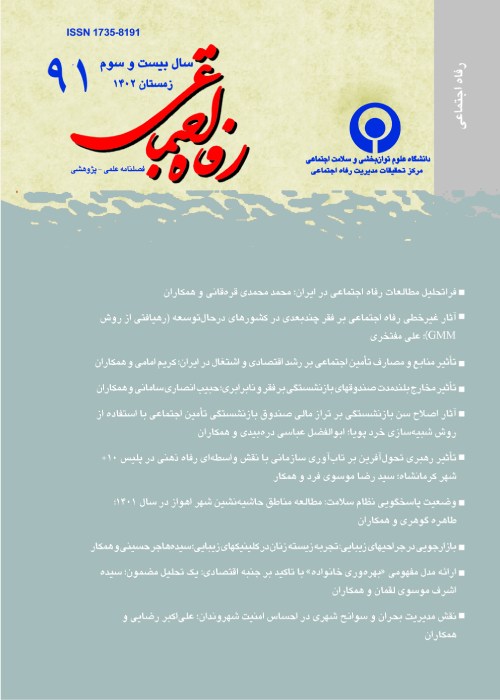The Relationship Between Social Welfare and Citizens Participation in Urban Affairs
Author(s):
Abstract:
Objective
Increases of population and Urbanization as an inclusive phenomenon, especially at the Metropolitans of Developed and Developing countries such an Iran, and problems spring from, had been caused that many of urban theoreticians consider to Citizen Participation at the Urban Affairs (CPUA). According to urban theories, citizen's participation provides various benefits to both the individuals and organizations. In that present research, CPUA refers generally to citizen involvement in public decision making, planning, elects, Participation in Quarter affairs, obey Traffic orders, pay taxes and related fields. The purpose of study was to investigate the impact of social welfare on CPUA. Therefore, in this research, the theoretical frameworks dealing with the concepts of social welfare and participation (Habermas, Masslow, Frazer, Luhman, Brber, Driscol, Runciman, Davis, and Crosby), and previous empirical researches(Lee, Smith, Ekstrom, Rebori, Rose), have been scientifically studied. The main hypothesis derived from theoretical framework, is that social welfare (Material and Non material welfare) has a key role on CPUA. Method
This study used survey method. To measure dependent and independent variables, the data is gathered from 700 head families whom selected via Multistage sampling and then random sampling from 7 municipality zones in Isfahan city. It is worth mention, population statistic was 444552 head family(in the base of Census of Population and Housing in 2006).The collection instrument of data was Questionnaire, So that The response categories are on a six -point Likert scale, ranging from ‘strongly disagree’ to ‘strongly agree’(Strongly Agree, Agree, Some deal Agree, Some deal Disagree, Disagree and Strongly Disagree). Data analysis was performed using SPSS16 for Windows and LISREL software. Findings
After doing the empirical test according to the data collected, Result showed that the rate of CPUA was high and significant relationship between CPUA as a dependent variable and independent variables (Feeling of Relative Deprivation, Institutional Trust, Social Satisfaction, Health Satisfaction, and Material welfare) has been found out. Multiple regression models were constructed to determining predictors of CPUA. Result showed the rate of R Adjusted Square equals%17. namely we can say that 17 percent of variations of dependent variable, explained by Feeling of Relative Deprivation, Institutional Trust, and Social Satisfaction. Other independent variables such a Health Satisfaction, and Material welfare, excluded from Regression model. consequently, influence of Institutional Trust on dependent variable, had been more than other variables. Results
Results show whatever increases Institutional Trust, Health Satisfaction, Social Satisfaction, and Material Welfare and decreases Feeling of Relative Deprivation among Citizens, the same extant increases CPUA. In short, Institutional Trust is a key point at predict citizen’s participation. Therefore policy makers could influence to citizens and caused them to CPUA on the condition that attract people trust previously.Keywords:
Language:
Persian
Published:
Social Welfare Quarterly, Volume:8 Issue: 32, 2009
Page:
91
magiran.com/p1244633
دانلود و مطالعه متن این مقاله با یکی از روشهای زیر امکان پذیر است:
اشتراک شخصی
با عضویت و پرداخت آنلاین حق اشتراک یکساله به مبلغ 1,390,000ريال میتوانید 70 عنوان مطلب دانلود کنید!
اشتراک سازمانی
به کتابخانه دانشگاه یا محل کار خود پیشنهاد کنید تا اشتراک سازمانی این پایگاه را برای دسترسی نامحدود همه کاربران به متن مطالب تهیه نمایند!
توجه!
- حق عضویت دریافتی صرف حمایت از نشریات عضو و نگهداری، تکمیل و توسعه مگیران میشود.
- پرداخت حق اشتراک و دانلود مقالات اجازه بازنشر آن در سایر رسانههای چاپی و دیجیتال را به کاربر نمیدهد.
In order to view content subscription is required
Personal subscription
Subscribe magiran.com for 70 € euros via PayPal and download 70 articles during a year.
Organization subscription
Please contact us to subscribe your university or library for unlimited access!



